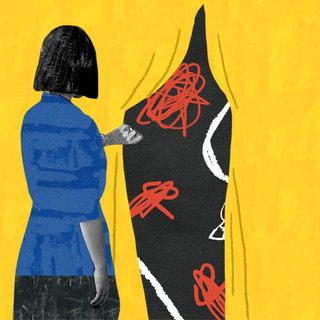
Andrew Tate Was Detained, But the Manosphere Persists
Individual accountability for its figureheads doesn’t de-radicalize the manosphere or its dangerous influence.

Last week saw a sliver of redemption for feminists who were concerned about the rise of men like Andrew Tate. After a bizarre provocation against climate activist Greta Thunberg, “manosphere” influencer Andrew Tate responded to her with a video that led to his detention by Romanian authorities. He’s being held under charges of human trafficking now — and while his capture is welcome, it still leaves the problem of the manosphere unaddressed. Many young men radicalized by Tate’s misogynistic ideology have expressed solidarity with Tate, seemingly more entrenched in their convictions that men are under attack.
Tate’s arrest, while a relief, prompts closer attention to the subculture that built him up. The manosphere isn’t just a digital ether: it’s a set of tangible ideas that exist in the form of fitness, wellness, lifestyle content that smuggle anti-feminism and men’s rights ideas in the process. It’s a new form of male supremacy masquerading as digital fora for young men to express their anxieties and resentments. There are a few recurring subgroups: incels, men going their own way (MGTOW), pick-up artists, and men’s rights activists.
But researchers have flagged that incels and men’s rights activists perpetuate an ideology that’s actively dangerous to society. A recent analysis suggested, moreover, that terrorism studies have a fundamental gap in not sufficiently studying incel violence as a form of extremism. Another report found that young boys have begun spouting manosphere talking points and harassing their school teachers who were women.
This means that Andrew Tate is a figurehead in the manosphere — and the real problem runs much deeper and takes more than his arrest to sufficiently resolve. Deradicalizing people entrenched in it requires understanding what makes them tick.
Take the idea of the “red pill” — a concept borrowed from The Matrix franchise. In manosphere subcultures, it refers to being awakened to the reality of the world, and radicalizing oneself in response to it. Almost like the opposite of being “woke”, taking the red pill is an exercise in dangerous self-pity. In Andrew Tate’s rhetoric, “The Matrix” features heavily as a murky artificial consciousness that society has built to undermine the agency of people — importantly, men. But as part of his promise to lure people out of “The Matrix,” Tate peddles violent stereotypes about women being property, rape being the victim’s fault, and how they do, in fact, belong in the kitchen.
This idea of victimhood to a grander, insidious scheme is a key facet of the manosphere, which Tate capitalizes on. Research has shown that incels tend to self-identify as victims, and then weaponize their victimhood in the form of violence against women.
Related on The Swaddle:
How the Rise of Internet Father Figures Threatens Women, Gender Minorities
In short, Andrew Tate radicalized young men while pretending to empower them. Even if he’s removed from the sphere of social discourse, the damage he’s done requires anti-carceral interventions to undo. It starts with identifying the unique language of the manosphere, and preventing online spaces from propagating it. But there’s another, and more difficult ingredient: compassion. “Youth are searching for that sense of belonging, that kind of grounding to explain what’s happening to them,” Brette Steele, senior director for Preventing Targeted Violence at the McCain Institute, toldCNN.
“We have to ask things like, when do youth actually develop the skill sets that can prevent some of these risk factors? When do they develop a positive sense of self-concept? When do they develop the ability to withstand rejection?” Steele added.
Another strategy includes redirecting impressionable men to positive models of masculinity before they enter the toxic rabbit hole of the manosphere, according to the Diverting Hate project, that aims to combat violent misogyny. “When you’re isolated… it can be easy to delude yourself into thinking [they] are the only ones on your side,” a former member of the manosphere said. He’s now part of a community of Redditors trying to help other men exit the toxic influence of men’s rights, incel, and other manosphere groups — before it’s too late.
But sometimes, it’s important to simply disprove the false dichotomies on which manosphere ideas rest. “One thing the right wing has done pretty effectively in the last few years is, they’ve managed to frame the discussion as a kind of puritan, moralistic, sermonizing left versus a kind of edgy, rebellious, punk-rock right,” Natalie Wynn, a YouTuber, popularly known as Contrapoints, who’s succeeded in deradicalizing many alt-right, incel men, told Vice.
“We can’t simply arrest our way out of this problem… Disengagement and deradicalization aren’t the soft option, they’re the smart option,” John Horgan, a deradicalization expert, told Wired. A group of experts on terrorism and radicalization has lately begun to grapple with a recurring undercurrent of all forms of extremism: a hatred for women, and a desire to dominate them. Incels are just the most direct about it.
Many organizations recommend greater engagement with gender justice as an intervention to incel ideology — but carceral approaches to it only distance people from such support even further. Recognizing the magnitude of the problem, then, shows that an individual’s arrest far from resolves it — it only lays bare how much more work there is to be done.
Rohitha Naraharisetty is a Senior Associate Editor at The Swaddle. She writes about the intersection of gender, caste, social movements, and pop culture. She can be found on Instagram at @rohitha_97 or on Twitter at @romimacaronii.
Related


The Shows, Movies, Books and Music That Defined 2022
